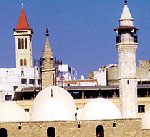London: "The Future of Arab-Western and Christian-Muslim Relations"
Report by the Rev. Michael Bos
The Rev. Michael Bos is the director of the Al Amana Centre in Muscat, Oman, an organization that works on interfaith and ecumenical relations in a country that has seen relatively little work in those areas, but which is becoming increasingly open to dialogue. He was one of the attendees at a seminar held in London on the two linked but not identical themes of Arab-Western and Christian-Muslim relations, and kindly provided [MECC] NewsReport [magazine] with the following summary of and reflections on the proceedings.
A Call to Meet
Heartrending events and military interventions have attracted media attention to Arab-Western relations, making these tensions the crucible through which people gauge each other. Sound bytes from the nightly news serve as the informational pipeline through which dispositions are formed towards entire regions and religions. Because of the media's focus on personalities, extremist voices and myopic political visions have access to the world stage, and this has only escalated the spiral of suspicion between cultures and religions. Unless alternative voices speak up, the voices heard are assumed to speak for all. The Arab Working Group on Muslim-Christian Dialogue responded to this challenge by convening a special seminar in London, 23-25 October 2003.
Though the work of the Arab Working Group focuses on co-citizenship of Arab Christians and Muslims, they believed it important to expand their dialogue and address the issues that are influencing religious and political decisions between East and West. Leaders from fourteen countries, all active in the public life of Arab and Western countries, met to reflect and strategize a way forward that builds upon the shared values of Muslims and Christians, Arabs and Westerners.
The event was opened by the Rt. Honorable & Rt. Reverend Richard Chartres, DD FSA, the Bishop of London, and by Mr. Mohammad Al Sammak of the Arab Working Group. The opening sessions addressed both the present state and future of Christian-Muslim relations, with presentations by Judge Abbas Al-Halabi, Dr. Tarek Mitri, Dr. Azzam Tamimi, Dr. Jim Jennings, and Mr. Wolf D.A. Aries. The topic was then broadened to Arab-Western relations, with a particular emphasis on how the conflicts in Iraq and Palestine affect these relations. Presentations were made by Mr. Samir Franjie, Mr. Saud Al Mawla, Dr. Hussain Shaban, Canon Andrew White, Dr. Mehdi Abdel Hadi, and Prof. Afif Safieh.
Preliminary Reflections & Conclusions
Throughout the spirited dialogue, there was a growing edge of frustration. This is not a critical statement, but an observation that points to the maturation of Christian-Muslim relations. It is no longer enough for the symbolism of a gathering, i.e., the fact that we meet across religious and cultural boundaries, to justify one's participation. It is also no longer sufficient to meet solely to make declarative statements about the common affirmations we hold. These are but first (albeit important) steps in the meeting of religions, not the end goal. The urgency of world events moves us to the central question for the future of interfaith and intercultural relations: How can the relationships we have fostered and the shared commitments we hold effect change in places that are mired in fear and hostility?
The challenge this represents is daunting. We are working against societal impulses that are quick to create divisions between us. As William Green has identified: "A society does not simply discover its others, it fabricates them, by selecting, isolating, and emphasizing an aspect of another people's life, and making it symbolize their difference." This essentialist approach allows people to see the world in generalizations, stereotypes, and simplified ways of dividing religions and cultures, often making enemies of those about whom we know little. There was a clear resolve among the participants to concentrate on apprising the public of the complexities of the peoples and situations faced, as these complexities do not represent trivial nuances or erudite musings, but are central elements necessary for true understanding. Without this, people are lacking the essential knowledge to draw accurate conclusions about others, which directly affects one's intent and actions toward others.
The seminar also revealed that the challenge is not only between faiths, but also within them. As we found encouragement in our ability as Muslims and Christians to engage each other, we also found ourselves asking how well we engage our own religious constituencies. It must be acknowledged that fanaticism and divisiveness arise from those who speak and act in the name of the same religions we represent. Therefore, we must pursue an agenda of intrafaith dialogue that leads religious communities to more just and irenic approaches. History is replete with examples of religion's ability to create conflict or offer peace, demand retribution or grant forgiveness, to see God at work in others or to view others as the enemy. A fundamental element in securing a lasting impact is helping religious leadership address sources of conflict and utilize resources for peace from within their faith traditions. Through this, it is also hoped that a broader representation of religious leadership will cooperate in bringing about just and peaceful approaches to common concerns.
It is hoped that the Arab Working Group can use this meeting as a way to expand participation and develop resources to meet the challenges before us. The case studies presented reminded us that the consequences of whether one responds and how one responds affect the day-to-day existence of countless people. The price being paid by the innocent is too high to accept inaction. Silence is an unjust response to injustice. Leadership and initiative are needed now.
First appeared in MECC NewsReport , Autumn 2003.
|
